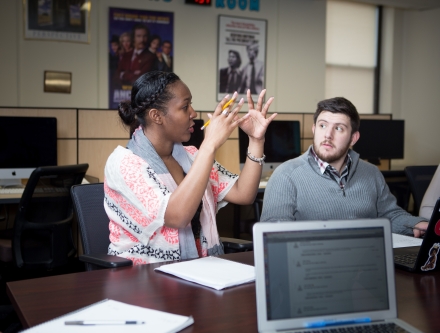
Communication Arts
- 120 Credits
- School of Liberal Arts
- Manhattan
- Westchester

Communication Arts Overview
Do you want to be a story teller? Craft engaging social media content? Work behind the scenes of your favorite steaming series? Produce the next big podcast? Or build a career in marketing, advertisting, or strategic communication?
Mercy’s Communication Arts program can help you make it happen. It’s a career-oriented, interdisciplinary program that’s designed to be flexible. This approach integrates coursework from various fields – from business, the Humanities, to social science – ensuring you receive a well-rounded, 21st-century education. You'll work with a PACT mentor as well as your Program Director to build a custom curriculum that matches your passions and career aspirations.

Career Ready Graduates
Mercy’s Communication Arts program will prepare you for success in a space that’s shaping public discourse, culture and innovation.
You’ll graduate with a robust set of hard and soft skills that are applicable across a variety of dynamic industries, including
- Content Creation
- Social Media Management
- Brand Management
- Entertainment and Media Production
- Advertising and Creative Strategy
- Nonprofit Communication and Advocacy
- Public Relations
Career development is embedded into the program. An internship is required for all students and up to nine credits of internships can be used toward their degrees, building on the cutting-edge classroom instruction you receive and applying it in the real world.
Want More Info?
We'd like to hear from you! Get more information.

Core Values
Our program is anchored by six core values that shape our students into effective, empathetic and creative communicators. Communication Arts is built around these values, to help students shape the future of the communication landscape.
Creativity
Our emphasis on Creativity nurtures original and innovative ideas to help students craft narratives, engage audiences and solve challenges.
Collaborative Problem Solving
Collaborative Problem Solving encourages students to draw on their collective knowledge to tackle complex problems and produce innovative solutions.
Adaptability
Adaptability prepares students to thrive in a fluid digital landscape.
Strategic Thinking
Strategic Thinking fosters the ability to conceive and implement long-term visions and goals.
Ethical Practice
Ethical Practice helps students weigh any potential harm content may cause.
Empathy and Self-reflection
We promote a culture of Empathy and Self-Reflection, which empowers students to communicate with a deep understanding of diverse perspectives and promotes self-awareness that enhances personal growth.
Frequently Asked Questions
Communication Arts is flexible, but this means students must work closely with the Program Director, faculty, and PACT to help focus on their career goals.
Yes! One internship is required in this major, but in Communication Arts, students may do up to nine internship credits.
Yes, faculty are always ready to help students with questions about what courses to take, the sequencing of courses, and career opportunities, including internships and cooperative education.
Full-time students can complete the 120-credit degree program in four years.
Program Details & Curriculum
General Liberal Arts and Sciences
General Education Requirements: 60 Credits
Major Concentration Communication Arts: 42 Credits
Open Electives: 18 Credits
Total: 120 Credits
For a full curriculum listing visit our catalog.
By the end of this program, students should be able to:
- Analyze communication challenges, identify opportunities, and develop strategic plans to meet them.
- Develop and execute creative solutions to meet a specific communication challenge.
- Demonstrate fluency with current communication tools and adaptability when engaging with emergent technologies.
- Demonstrate the ability to contribute to team efforts by effectively facilitating, listening, speaking, and writing.
- Develop the ability to self-examine and to perceive situations from others’ perspectives and motivations.
- Recognize and apply personal and/or professional principles when crafting messages.
Full-Time Faculty
Jason Zalinger
- VIC 209B
- jzalinger@mercy.edu
- (914) 674-7511
Part-Time Faculty
Felipe Henao
- Hudson 118
- fhenao@mercy.edu
- (914) 674-7543





